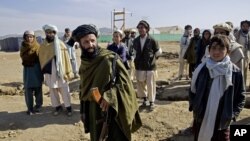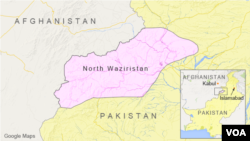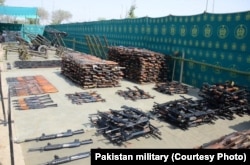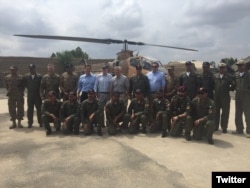Authorities in Pakistan say tens of thousands of families who took refuge in Afghanistan two years ago after fleeing a Pakistani counter-militancy offensive have until Monday to register to return home.
Pakistani authorities have been pushing for the families from the North Waziristan tribal region to return home for months, but on Wednesday officials issued a formal notice that they have until August 1st to submit "pre-registration and verification" forms, which authorities say they have already distributed to displaced families through their community leaders.Those who do not could face as yet unspecified hurdles in returning home.
According to UNHCR estimates, as of December 2014, more than 291,800 individuals crossed into Afghanistan. Most of them settled in Gulan Camp in Gurboz district of Khost. By May 2015, Khost and Paktika hosted 32,576 families with over 205,000 individuals.
.
“After receiving and completing the pre-registration process by August 1, a jirga (traditional assembly of tribal elders) will be convened in which relevant families through their tribal elders will be informed about conditions, rules and regulations under which they will be resettled,” the statement said, adding the date for convening the jirga will be announced after August 5.
The statement reiterated that the Pakistani government has already decided to bring the refugees from Afghanistan through the officially designated Ghulam Khan border crossing and they can hand over pre-registration forms to any government officials stationed there.
Rumors of stripping citizenship
Pakistani officials admit they have faced difficulties in persuading the displaced families to come back from Afghanistan. This has prompted rumors the displaced people could lose their citizenship unless they move back.
Despite repeated extensions in the deadline for their repatriation and intensive messaging through their tribal elders, only ten percent of families submitted their registration forms by last week, Kamran Afridi, the top government administrator in Waziristan, told VOA.
But speaking on Thursday, Afridi reported the process has since accelerated, praising VOA for spreading the message to many Afghan areas hosting Pakistani refugees.
“As of this day (Thursday) we have seen a lot of progress since we announced the July 25 deadline for submitting the forms. This information that we had also communicated and announced through your radio has effectively reached many (Afghan) areas and those who had missed the initial message have now sent us their forms.”
Afraid said that around 6,000 families have so far submitted their forms and estimated 2,000 to 3,000 have not yet returned the documents. That's still just a fraction of those who fled abroad. However, contrary to earlier rumors that claimed those who did not return could lose their Pakistani citizenship, Afridi said that any Pakistani national living as refugee in Afghanistan is free to return home when he or she wishes. But the process to return home could change after this initial registration and repatriation stage.
In the past, officials have said that those who fail to register and return their villages without proper documentation will not be entitled to a promised assistance package of about $350 (35,000 Pakistani rupees), a six-month food ration as well as other essential commodities.
Pakistani authorities have declared the North Waziristan region safe, and the army estimates that nearly 70 percent of the internally displaced families who had fled to camps inside Pakistan have since returned to their native villages. Authorities say they plan to resettle all families, including those in Afghanistan by December 2016.
Reluctance to leave Afghanistan
However some refugees contacted by VOA in Afghanistan say they are reluctant to come back fearing the lack of lasting peace.
“We will go back only if the government can rebuild North Waziristan like it was before the operation. We are happy in Afghanistan, they are treating us well and we feel safer in this country,” Ikramullah Wazir, a refugee in Khost said.
“If the government allows us to live our free tribal life, then we are ready to return,” Noor Ali Khan, a refugee in Gulan camp said.
Many complain the government's compensation package is not enough to make up for what they lost.
"We used to have farmlands, houses and shops. It would take us at least ten years to rebuild what we have lost," a refugee, Jalalabad Khan said.
"If all refugees decided to return, we would also go to our areas, but the amount of money they have offered will not help us build even a single room," Khan said.
A refugee elder told VOA that a refugee tribal council has asked the Pakistani government to increase the amount of assistance.
“We asked them to increase the assistance amount, and build markets,” the tribal elder, Haji Omaruddin Wazir, said, adding that the council also sought assurances that they would be treated fairly by the army.
Others say the resettlement plan is going smoothly.
Tribal elder Malik Habib, who comes from Miransha — the main town in North Waziristan — told VOA he has relatives among IDPs on the Afghan side.
Habib, himself an IDP, says that there are more than 7,000 families sheltering on the Afghan side of the border and because they have permission to move freely across the frontier, they also have collected documentation forms and some of them have returned to their villages on the Pakistani side.
According to Habib, the families are asked to fill up the form and wait until they are officially informed that repatriation process to their particular villages is starting on a certain date. Once that announcement is made, the families are required to submit the forms at Bannu center to be able to receive promised assistance.
Pakistani authorities also insist the documentation step is key to ensuring the future security of the remote region as it will discourage militants from returning and again taking shelter in the population.
The Waziristan region is among the seven federally administered tribal districts on the Afghan border and until recently U.S. officials condemned it as the “epicenter” of international terrorism.
Pakistan military commanders say the counter-militancy offensive has destroyed the terrorism infrastructure, including hundreds of bomb-making factories and killed thousands of local and foreign militants.
A group of influential U.S. Congressmen led by Senator John McCain who visited Pakistan earlier this month were flown to North Waziristan's administrative headquarters, Miranshah, in a military helicopter to see the progress.
“They have cleared out that part of Pakistan, they are going to relocate people hopefully with a better hope for life, they are looking at securing the Pakistan border in a more substantial way," Senator Lindsey Graham told reporters after the Waziristan trip.
"So I want to help Pakistan and they are doing the right thing and there is a lot of improvement to be made. But I would acknowledge it a step in the right direction."








